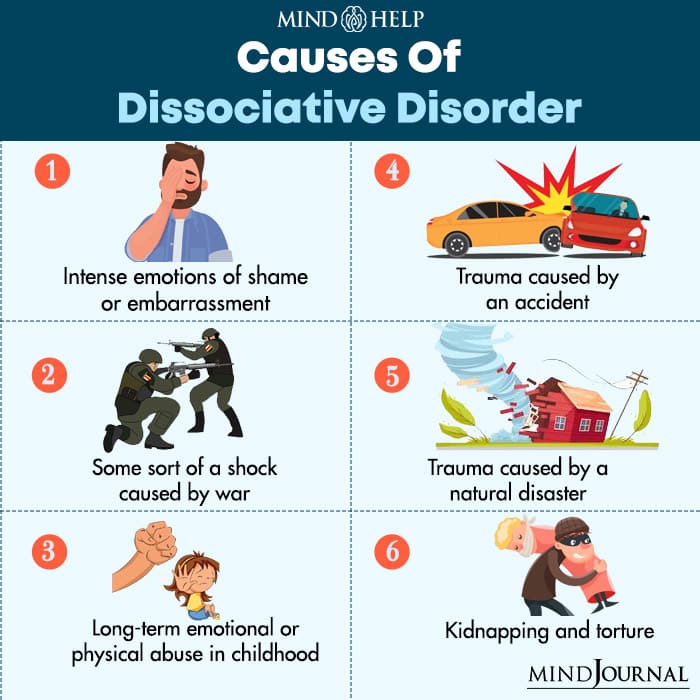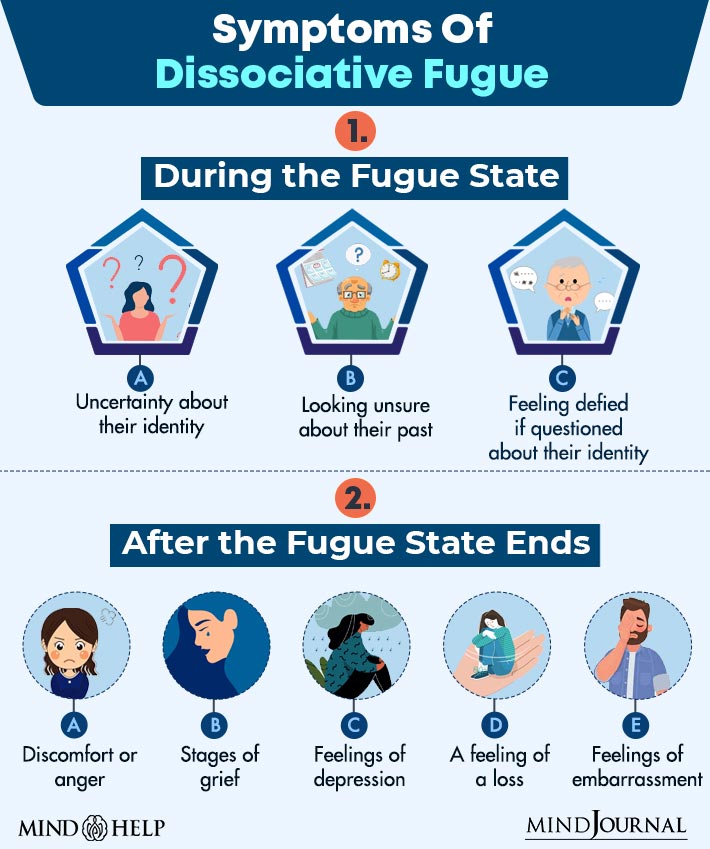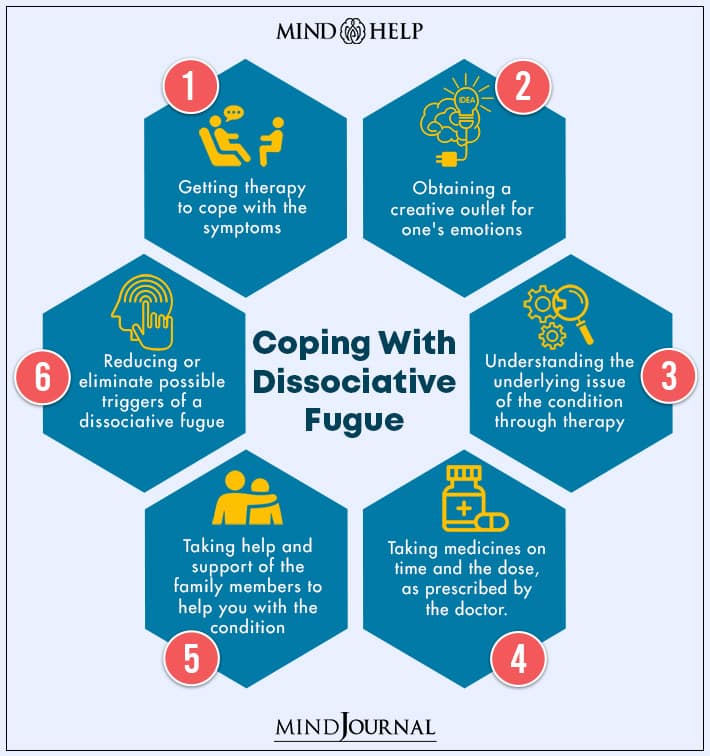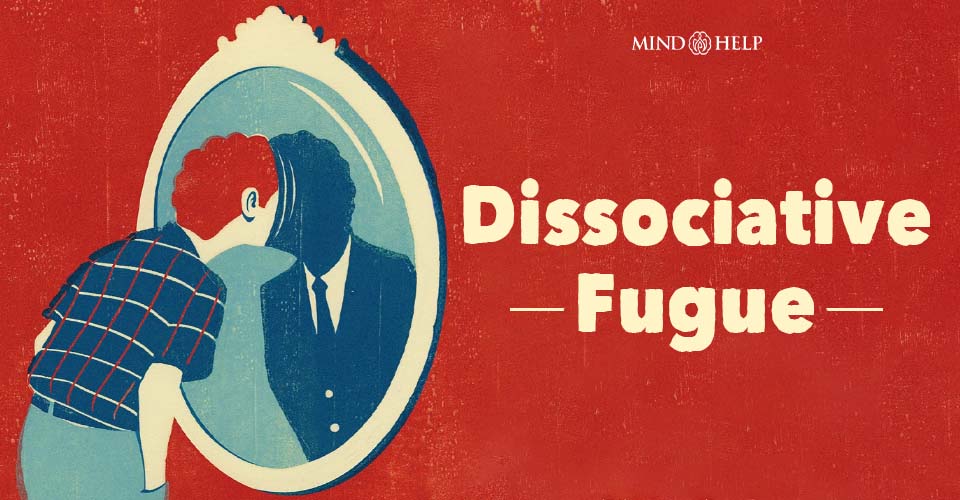Table of Contents
Dissociative fugue is a rare psychological condition characterized by sudden, unexpected travel away from one’s usual surroundings, accompanied by a loss of personal identity or important autobiographical information. In some cases, individuals may even assume a new identity without awareness of their past.
What Is Dissociative Fugue?
Dissociative fugue, formerly known as psychogenic fugue, is a rare and complex type of dissociative disorder. It involves reversible amnesia that affects a person’s memories, personality, and sense of personal identity. Episodes can last from hours to days, weeks, or even months. A hallmark feature is sudden, unplanned travel—often far from one’s home or workplace—during which the individual may adopt a completely new identity and lifestyle, typically disconnected from their previous life.
The term “fugue” originates from the Latin word for “flight,” reflecting the impulsive wandering associated with this condition. During a fugue state, individuals lose awareness of who they are and may appear completely normal to others, without any noticeable signs of mental illness, unusual behavior, or disorientation.
This lack of outward symptoms can make the condition particularly difficult to detect. However, dissociative fugue can significantly disrupt a person’s ability to function socially, maintain relationships, or perform daily responsibilities, especially when the episode ends and the individual is left confused or distressed about their actions and experiences during the fugue.
As per a study 1 Raval, C. M., Upadhyaya, S., & Panchal, B. N. (2015). Dissociative fugue: Recurrent episodes in a young adult. Industrial psychiatry journal, 24(1), 88–90. https://doi.org/10.4103/0972-6748.160944 , dissociative fugue is a ”rare psychiatric disorder identified by sudden or unexpected traveling from one’s customary place of living or work”.
Traumatic events resulting in an altered state of consciousness backed by a wish to flee are assumed to be the underlying cause. Additionally, the personality split is the underlying defense mechanism used by an individual to cope with traumatic memories.
Given the fact that it is a rare disorder, the prevalence rate of dissociative fugue is nearly 0.2% 2 Mamarde, A., Navkhare, P., Singam, A., & Kanoje, A. (2013). Recurrent dissociative fugue. Indian journal of psychological medicine, 35(4), 400–401. https://doi.org/10.4103/0253-7176.122239 across the population.
If the dissociative fugue episode is brief, the individual may only appear to have missed work or returned home late. However, in cases where the fugue lasts for several days or longer, the person may travel a considerable distance from home, assume a completely new identity, and even begin a new job—completely unaware that they have left behind another life.
In many instances, fugue states seem to reflect unconscious wish-fulfillment or represent an extreme psychological response to overwhelming stress, trauma, or embarrassment. As a result, dissociative fugue is often misunderstood or misinterpreted as malingering—the deliberate faking of physical or psychological symptoms for personal gain.
While both may appear to involve avoidance of responsibility or accountability, clinicians are typically able to distinguish between the two. Unlike individuals with dissociative fugue, malingerers tend to exaggerate, dramatize, or fabricate symptoms such as memory loss. In contrast, those experiencing a fugue are genuinely unaware of their condition and exhibit no conscious intent to deceive.
Causes Of Dissociative Fugue

Dissociative fugue is typically triggered by intensely emotional or traumatic experiences. It is believed to function as a psychological escape mechanism, allowing individuals to avoid or dissociate from stressors they are unable to confront or process consciously. One of the most common causes is severe sexual trauma, though other triggering factors may include:
- Experiencing or witnessing a natural disaster or accident
- Combat or war-related trauma
- Physical or emotional abuse
- Sudden loss of a loved one
- Financial ruin or major life upheaval
- Extreme guilt or shame
- Ongoing domestic violence
Each of these situations can overwhelm a person’s ability to cope, potentially leading to a dissociative response such as fugue.
It is important to note that the triggering trauma may either be directly experienced by the individual or witnessed as it happened to someone else—yet still cause profound psychological distress. In some cases, merely observing a traumatic event can be enough to induce dissociative symptoms.
Additionally, research suggests a possible genetic component, as individuals with a family history of dissociative disorders may have a higher likelihood of developing similar conditions. While a person may appear outwardly normal after the initial trauma, exposure to certain triggers or reminders of the past event can suddenly provoke a dissociative fugue episode.
A study 3 Igwe M. N. (2013). Dissociative fugue symptoms in a 28-year-old male Nigerian medical student: a case report. Journal of medical case reports, 7, 143. https://doi.org/10.1186/1752-1947-7-143 represents a case where it was reported that dissociative fugue is often related to stressful life events and can occur with a comorbid depressive disorder. The case study is about a 28-year old patient who is a male final year medical student from the South-Eastern region of Nigeria. He was missing for ten days as his whereabouts were unknown. Prior to this incident, the patient was extremely stressed as he was under severe economic and academic pressures.
While studying alone in his room at night, the patient reported a vivid and disturbing hallucination in which he saw a full human skeleton sitting across from him at the same table, appearing to read. Simultaneously, he described feeling intensely uneasy and noted that the entire room seemed to spin, with everything around him becoming unstable and unreal.
Following this episode, he was overwhelmed by fear and confusion. Two days later, he found himself in South-Western Nigeria—approximately 634 kilometers away from his university—accompanied by his younger sibling. According to the sibling’s account, the patient appeared disheveled and physically exhausted, yet was fully conscious, alert, and had arrived at the house unaided.
Symptoms of Dissociative Fugue

As mentioned earlier, dissociative fugue can last for just a few hours, during which the affected individual may appear confused, disoriented, or forgetful to those around them. In many cases, once the episode ends, the person returns to their normal state with little or no awareness of what transpired. Because of its brief duration, such episodes may go entirely unnoticed or be mistaken for simple forgetfulness or fatigue.
However, when the fugue state extends over weeks, months, or even longer, more noticeable and disruptive symptoms may emerge, including:
1. During the Fugue State
When a person is in the midst of a fugue state, he/she may show the following symptoms:
- Uncertainty about their identity
- Looking unsure about their past
- Feeling defied if questioned about their identity
During a dissociative fugue episode, the individual may not display any obvious signs of mental illness, making the condition difficult to detect. This is because, from the person’s perspective, the adopted identity feels entirely real and authentic. They genuinely believe they are living their new life, unaware that it is a dissociative response. It is usually only when the individual is confronted with their true identity or past life that confusion, distress, or psychological symptoms begin to emerge.
2. After the Fugue State Ends
Upon the passing of a dissociative fugue state, a person may experience the following.
- Discomfort or anger
- Stages of grief
- Feelings of depression
- A feeling of a loss
- Feelings of embarrassment
- Feelings of distress about being in an unfamiliar place
In many cases, the individual may abruptly abandon their current life and begin a completely new one, often drastically different from their previous lifestyle.
Read More About Embarrassment Here
Diagnosis Of Dissociative Fugue
Before exploring the methods used to diagnose dissociative fugue, it is important to first understand the diagnostic criteria established for identifying this condition.
1. Diagnosis Criteria As Per DSM-IV
When dissociative fugue was originally considered as a separate disorder in DSM-IV, the following criteria had to be met for diagnosis.
- Abrupt or unforeseen journey away from one’s home or work
- The incapability to memorize your past experiences
- Confusion about one’s identity and taking on a new one
- Notable distress and impairment about these issues
However, it must be noted that dissociative fugue is only diagnosed retrospectively, as the concerned person when in the middle of the condition may not show any outward signs, thereby making it hard for others to recognize the disorder. Therefore, once the fugue ends, it is then that the diagnosis is usually made.
2. Diagnosis Criteria As Per DSM-5
Since the release of the DSM-5, the dissociative fugue became a subtype of dissociative amnesia (a disorder) and relates to the symptoms of dissociative amnesia followed by the state of purposeful travel or bewildered wandering.
There are other different types of amnesia that be combined with this condition, such as:
- Localized amnesia
- Systematized amnesia
- Generalized amnesia
- Selective amnesia
- Continuous amnesia
Read More About DSM 5 Here
3. Diagnostic Exclusions
The condition will not be diagnosed if the fugue state is associated directly with any of the following conditions or situations, such as:
- Head trauma
- A general medication condition
- Ingestion of psychotropic substances
- Diagnosis of delirium
- Dissociative identity disorder
- Diagnosis of dementia
- Diagnosis of epilepsy
- Ingestion of drugs or alcohol
Furthermore, in very rare cases, people may pretend to suffer from dissociative fugue in order to escape legal or other reasons.
4. Methods Of Diagnosis
The diagnostic process for dissociative fugue typically begins with a thorough medical and neurological evaluation to rule out physical causes of memory loss or disorientation. If necessary, neuroimaging studies such as an MRI or tests like an electroencephalogram (EEG) may be conducted to exclude conditions such as epilepsy or brain injury. Once organic causes are eliminated, a psychiatrist or psychologist proceeds with a comprehensive psychological assessment. This includes clinical interviews and standardized diagnostic tools to determine whether the individual’s symptoms align with the criteria for dissociative fugue.
Dissociative Fugue Treatment
Since the duration of episodes varies, some may resolve rapidly, while others can continue for years. There may be multiple episodes as well.
The treatment goal of dissociative fugue is divided into two parts.
- To help recover the person’s identity and foster coping strategies to stop the same thing from occurring again.
- To help one come to terms and face the original trauma that had triggered the episode.
Treatment Methods
There are various treatment options that can be implemented to treat a person with dissociative fugue. These are:
- Psychotherapy – Helps the individual understand and change unhealthy thinking patterns.
- Medication – Used to treat co-occurring symptoms such as depression and anxiety.
- Family Therapy – Encourages support and understanding from close family members.
- Art Therapy – Offers a safe, creative outlet to explore and express emotions.
- Clinical Hypnosis – May help access repressed memories and promote integration.
- Eye Movement Desensitization and Reprocessing (EMDR) – Assists in managing flashbacks and post-traumatic stress symptoms.
- Dialectical Behavior Therapy (DBT) – Supports regulation of overwhelming or intense emotions.
- Meditation and Relaxation Techniques – Aid in reducing stress and increasing awareness of one’s internal state.
Unfortunately, without treatment of the underlying issue, dissociative fugue may happen multiple times.
Coping With Dissociative Fugue

Dissociative fugue is a unique condition in which the individual may not be aware that they are experiencing a mental disorder. This lack of awareness makes coping with the condition particularly challenging. However, for individuals who have experienced episodes in the past, there are certain strategies that can help reduce the risk of recurrence. These include:
- Engaging in regular psychotherapy to address unresolved trauma and build healthy coping mechanisms.
- Building a strong support system through trusted family members, friends, or support groups.
- Identifying and managing triggers such as stress, trauma reminders, or emotional overload.
- Practicing grounding techniques and mindfulness to stay present and connected to one’s identity.
- Maintaining a structured daily routine to provide stability and reduce disorientation.
- Avoiding alcohol and substance use which can worsen dissociative symptoms or lead to loss of control.
- Keeping a journal or record of daily events and thoughts to reinforce memory and self-awareness.
- Following up with mental health professionals regularly even when symptoms are not present.
Read More About Meditation Here
How To Help Someone With Dissociative Fugue?
If someone close to you has been diagnosed with dissociative fugue, here are a few suggestions to help that person with this condition.
- Accompany the individual to therapy sessions to gain a deeper understanding of the disorder and learn effective ways to provide support.
- Identify and be mindful of potential triggers, showing sensitivity to situations or topics that might cause distress or lead to dissociation.
- Ensure the person receives consistent love, care, and emotional support, while also helping them adhere to prescribed medications and treatment plans as directed by their psychiatrist.
Is It Possible To Prevent Dissociative Fugue?
While dissociative fugue cannot be entirely prevented, early intervention and treatment can play a crucial role in managing symptoms and preventing them from worsening. Prompt psychological support following a traumatic event or after an episode of fugue may also help reduce the risk of further dissociation or escalation of the condition.
Our Final Words
Dissociative fugue is a rare and complex form of dissociative amnesia that still requires further research for better understanding and treatment. For those living with this condition, it’s important to remember that they are not alone—others are navigating similar experiences. Family members and loved ones play a vital role and should ensure that appropriate treatment and support systems are in place to help prevent future episodes and promote long-term recovery. Compassion, patience, and proactive care can make a significant difference in managing this condition.
Dissociative Fugue At A Glance
- Dissociative fugue, formerly known as psychogenic fugue, is a rare subtype of dissociative disorder characterized by sudden travel and loss of personal identity.
- It is typically triggered by extremely stressful or traumatic emotional experiences, serving as a psychological escape from overwhelming circumstances.
- Diagnosis begins with comprehensive medical and neurological assessments to rule out physical conditions, followed by psychological evaluations to confirm the presence of dissociative fugue.
- One of the challenges in identifying this condition is that the person may not be aware they are experiencing a mental disorder, as the fugue state often feels completely real to them.
- Prevention of dissociative fugue is not always possible, but early intervention and consistent treatment can help manage symptoms and reduce the risk of recurrence.
- As a complex and rare form of dissociative amnesia, dissociative fugue requires continued research to improve understanding, diagnosis, and treatment approaches.
Frequently Asked Questions (FAQs)
What is dissociative fugue?
Dissociative fugue is a rare psychological condition characterized by sudden, unexpected travel away from one’s usual surroundings, accompanied by a loss of personal identity or important autobiographical information. In some cases, individuals may even assume a new identity without awareness of their past.
How long does dissociative fugue last?
Dissociative fugue can last anywhere from a few hours to several weeks, months, or even longer. The duration varies based on the individual and the severity of the triggering trauma.











